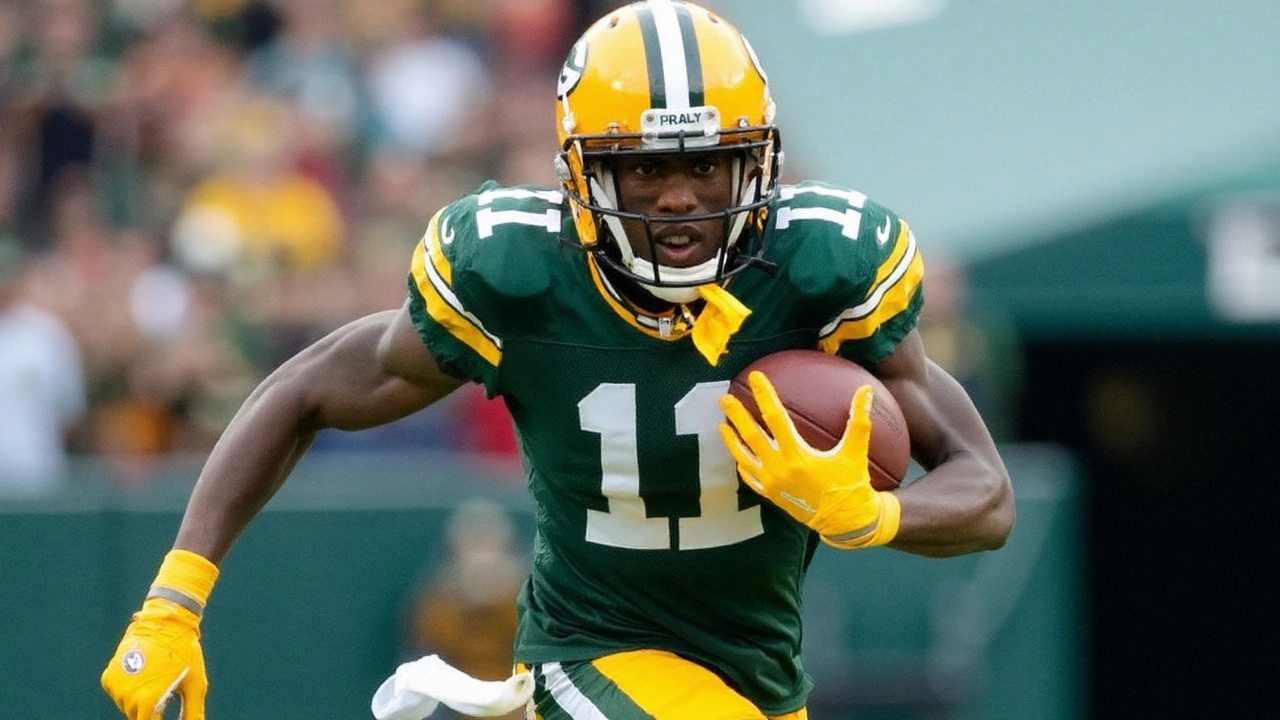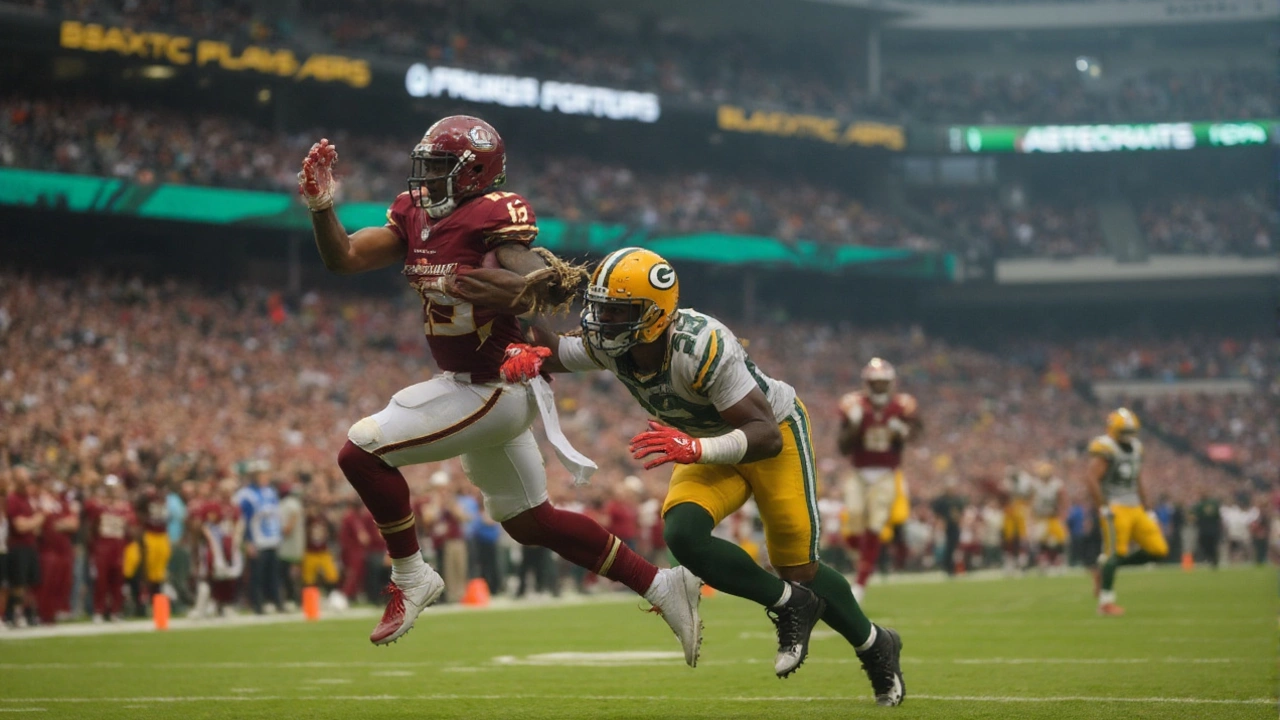Lambeau’s lights suited the home team just fine. On a national Thursday Night Football stage, the Green Bay Packers handled the Washington Commanders 27-18, building a multi-score lead, absorbing a late surge, and walking out 2-0 with the kind of balanced performance coaches love on a short week.
The game, played September 11, 2025, streamed on Amazon Prime Video with local coverage on WGBA-TV in Green Bay. It wasn’t a shootout. It was a steady, methodical win that showed how Green Bay’s passing rhythm with Jordan Love and the tight ends can pair with a physical ground game to control tempo when it matters.
How the game unfolded
Green Bay set the tone early: seven points in the first quarter, another touchdown before halftime, and Washington stuck on a field goal. At 14-3 at the break, the Packers had the game where they wanted it—tilted toward their script, not the Commanders’ pace.
Jordan Love looked comfortable and decisive, finishing 19-of-31 for 292 yards and two touchdowns. The most important piece? The connection with tight end Tucker Kraft. Kraft turned the middle of the field into his personal runway, catching six passes for 124 yards and a score. He beat zone looks by sitting in the soft spots, and when Washington tried to squeeze him with safeties, he worked leverage and kept the chains moving.
Josh Jacobs handled the grunt work with 23 carries for 84 yards and a touchdown. His runs weren’t flashy, but they mattered. He carved out four and five-yard chunks that kept Green Bay ahead of the sticks. When the Packers needed to choose between risk and control, they leaned on Jacobs to land body blows and shorten the game.
Green Bay tacked on a third-quarter field goal for a 17-3 cushion. Washington’s defense stiffened at times, but the Packers kept their balance and stayed patient. When the Commanders showed light boxes, Green Bay ran it. When they crept down, Love worked play-action and hit Kraft in stride.
Washington’s offense woke up late. Second-year quarterback Jayden Daniels stayed poised even as the pocket compressed, completing 24-of-42 for 200 yards and two touchdowns. He found veteran tight end Zach Ertz six times for 64 yards and a score, a reliable outlet on stick and option routes when the Packers disguised pressure. Austin Ekeler had a quiet night on the ground with eight carries for 17 yards, and that lack of run punch left Daniels to manufacture most of the offense on his own.
The fourth quarter got anxious for the home crowd. Washington put up 15 in the final frame and threatened to turn the night. But the Packers matched them with 10 of their own, sliding back into control with timely throws and a late scoring push that kept the Commanders at arm’s length. That response—answering a surge instead of bleeding out the clock—will sit nicely in the Packers’ film room this week.
Defensively, Green Bay didn’t dominate the stat sheet so much as they shaped the flow. They chased Daniels off his first read, forced throws underneath, and rallied to the ball. For three quarters, Washington’s passing game didn’t create explosives, and without those, the longer drives demanded perfection. The Commanders found some of it late—but not enough to erase the early gap.
Green Bay now sits 2-0 overall and 2-0 at home. Washington drops to 1-1 and 0-1 on the road, leaving a taste of what could have been if the offense had woken up a quarter sooner.

The takeaways and what it means
Thursday games are about survival as much as style. With limited rest and a condensed install, the cleanest plan usually wins. Matt LaFleur leaned on what travels: tight end matchups, play-action answers, and a patient run game. The Packers didn’t chase explosives; they created them out of structure, especially with Kraft on seams and crossers after motion.
For Washington, the outline is familiar: Kliff Kingsbury’s offense wants tempo, spacing, and rhythm throws to get the quarterback comfortable. But without consistent early-down wins, the Commanders had to climb uphill into longer passing situations. Daniels handled it with grit—two touchdown passes reflect that—but the lack of a run threat squeezed the playbook on a night when Green Bay controlled field position and possession.
Both teams will take a different lesson into their extended weekend. Green Bay gets a mini-bye to clean up details, especially the fourth-quarter wobble that let Washington back in it. They’ll like the toughness up front and the growing trust between Love and his tight end room. Washington heads home knowing the defense did enough to keep the game in reach, but the offense can’t wait until the last act to punch back.
If you’re tracking the bigger picture, the Packers’ early identity is clear: spread the ball to stress the middle of the field, then let the run game chew clock. Love’s stat line—292 and two touchdowns—tells part of it. The rest is about choices and leverage. He didn’t force throws outside the numbers. He worked with what the coverage gave him and let his playmakers do the heavy lifting after the catch.
Kraft deserves his spotlight. In a league that often turns tight ends into safety valves, he looked like a featured piece. Washington tried linebackers early, then mixed in safeties. Neither answer consistently held up. That’s the kind of matchup win Green Bay can carry into colder months when throwing windows tighten.
Jacobs’ volume and finish in short-yardage kept the Packers out of trouble. It’s the strategy you want with a lead: stack first downs, drain snaps, and make the other team play perfect football for three straight possessions. When Washington injected urgency late, the Packers didn’t flinch—they slid back into their scripted answers and forced the Commanders to burn clock to score.
Washington’s ledger isn’t empty, either. Daniels didn’t blink. The late scoring run shows the timing with Ertz is real and repeatable, and the young quarterback’s willingness to stand in and deliver kept the margin respectable. If the Commanders find a steadier ground game, the passing concepts Kingsbury prefers will open up earlier, and Daniels won’t be living on third-and-long.
Special teams and situational moments tilted the night toward Green Bay. Field goals matter when games tighten, and so does the ability to flip field position on a short week. The Packers managed those margins—nothing flashy, just reliable operations that stack small edges into a scoreboard lead.
Here are the numbers that framed it:
- Score by quarter: Packers 7-7-3-10, Commanders 0-3-0-15
- Jordan Love: 19/31, 292 yards, 2 TDs
- Tucker Kraft: 6 receptions, 124 yards, 1 TD
- Josh Jacobs: 23 carries, 84 yards, 1 TD
- Jayden Daniels: 24/42, 200 yards, 2 TDs
- Zach Ertz: 6 receptions, 64 yards, 1 TD
- Austin Ekeler: 8 carries, 17 yards
Context matters, too. Thursday nights compress everything—game plans, recovery, nerves. That’s why the broadcast on Amazon Prime Video often shows a different flavor of football: more base concepts, sharper focus on execution. Green Bay executed earlier and more often. Washington executed late and nearly turned it. The gap between those two timelines decided the result.
Green Bay’s fans packed Lambeau, and the noise was there from the first defensive snap. The Packers rewarded it with a clean start and a finish that steadied after the Commanders made it uncomfortable. It wasn’t perfection. It was a professional win that fits the shape of a long season.
Next for the Packers: a few precious days to heal up, dig into self-scout, and keep building the Love-to-Kraft engine that powered this one. Next for Washington: finding earlier rhythm for Daniels and a running game that keeps defenses honest before the fourth quarter.
On a short week in September, that’s the difference between 2-0 and 1-1.
